- CLASSIC MAGAZINES
- REVIEW CREW
A show recapping what critics thought back
when classic games first came out! - NEXT GENERATION'S BEST & WORST
From the worst 1-star reviews to the best
5-stars can offer, this is Next Generation! - NINTENDO POWER (ARCHIVE)
Experience a variety of shows looking at the
often baffling history of Nintendo Power! - MAGAZINE RETROSPECTIVE
We're looking at the absolutely true history of
some of the most iconic game magazines ever! - SUPER PLAY'S TOP 600
The longest and most ambitious Super NES
countdown on the internet! - THEY SAID WHAT?
Debunking predictions and gossip found
in classic video game magazines! - NEXT GENERATION UNCOVERED
Cyril is back in this spin-off series, featuring the
cover critic review the art of Next Generation! - HARDCORE GAMER MAGAZING (PDF ISSUES)
Download all 36 issues of Hardcore Gamer
Magazine and relive the fun in PDF form!
- REVIEW CREW
- ELECTRONIC GAMING MONTHLY
- ELECTRONIC GAMING MONTHLY RANKS
From Mario to Sonic to Street Fighter, EGM
ranks classic game franchises and consoles! - ELECTRONIC GAMING MONTHLY BEST & WORST
Counting down EGM’s best and worst reviews
going year by year, from 1989 – 2009! - ELECTRONIC GAMING BEST & WORST AWARDS
11-part video series chronicling the ups and
downs of EGM’s Best & Worst Awards!
- ELECTRONIC GAMING MONTHLY RANKS
- GAME HISTORY
- GAME OVER: STORY BREAKDOWNS
Long-running series breaking down game
stories and analyzing their endings! - A BRIEF HISTORY OF GAMING w/ [NAME HERE]
Real history presented in a fun and pithy
format from a variety of game historians! - THE BLACK SHEEP
A series looking back at the black sheep
entries in popular game franchises! - INSTANT EXPERT
Everything you could possibly want to know
about a wide variety of gaming topics! - FREEZE FRAME
When something familiar happens in the games
industry, we're there to take a picture! - I'VE GOT YOUR NUMBER
Learn real video game history through a series
of number-themed episodes, starting at zero! - GREAT MOMENTS IN BAD ACTING
A joyous celebration of some of gaming's
absolute worst voice acting!
- GAME OVER: STORY BREAKDOWNS
- POPULAR SHOWS
- DG NEWS w/ LORNE RISELEY
Newsman Lorne Riseley hosts a regular
series looking at the hottest gaming news! - REVIEW REWIND
Cyril replays a game he reviewed 10+ years
ago to see if he got it right or wrong! - ON-RUNNING FEUDS
Defunct Games' longest-running show, with
editorials, observations and other fun oddities! - DEFUNCT GAMES QUIZ (ARCHIVE)
From online quizzes to game shows, we're
putting your video game knowledge to the test!- QUIZ: ONLINE PASS
Take a weekly quiz to see how well you know
the news and current gaming events! - QUIZ: KNOW THE GAME
One-on-one quiz show where contestants
find out if they actually know classic games! - QUIZ: THE LEADERBOARD
Can you guess the game based on the classic
review? Find out with The Leaderboard!
- QUIZ: ONLINE PASS
- DEFUNCT GAMES VS.
Cyril and the Defunct Games staff isn't afraid
to choose their favorite games and more! - CYRIL READS WORLDS OF POWER
Defunct Games recreates classic game
novelizations through the audio book format!
- DG NEWS w/ LORNE RISELEY
- COMEDY
- GAME EXPECTANCY
How long will your favorite hero live? We crunch
the numbers in this series about dying! - VIDEO GAME ADVICE
Famous game characters answer real personal
advice questions with a humorous slant! - FAKE GAMES: GUERILLA SCRAPBOOK
A long-running series about fake games and
the people who love them (covers included)! - WORST GAME EVER
A contest that attempts to create the worst
video game ever made, complete with covers! - LEVEL 1 STORIES
Literature based on the first stages of some
of your favorite classic video games! - THE COVER CRITIC
One of Defunct Games' earliest shows, Cover
Critic digs up some of the worst box art ever! - COMMERCIAL BREAK
Take a trip through some of the best and
worst video game advertisements of all time! - COMIC BOOK MODS
You've never seen comics like this before.
A curious mix of rewritten video game comics!
- GAME EXPECTANCY
- SERIES ARCHIVE
- NINTENDO SWITCH ONLINE ARCHIVE
A regularly-updated list of every Nintendo
Switch Online release, plus links to review! - PLAYSTATION PLUS CLASSIC ARCHIVE
A comprehensive list of every PlayStation
Plus classic release, including links! - RETRO-BIT PUBLISHING ARCHIVE
A regularly-updated list of every Retro-Bit
game released! - REVIEW MARATHONS w/ ADAM WALLACE
Join critic Adam Wallace as he takes us on a
classic review marathon with different themes!- DEFUNCT GAMES GOLF CLUB
Adam Wallace takes to the links to slice his way
through 72 classic golf game reviews! - 007 IN PIXELS
Adam Wallace takes on the world's greatest spy
as he reviews 15 weeks of James Bond games! - A SALUTE TO VAMPIRES
Adam Wallace is sinking his teeth into a series
covering Castlevania, BloodRayne and more! - CAPCOM'S CURSE
Adam Wallace is celebrating 13 days of Halloween
with a line-up of Capcom's scariest games! - THE FALL OF SUPERMAN
Adam Wallace is a man of steel for playing
some of the absolute worst Superman games! - THE 31 GAMES OF HALLOWEEN
Adam Wallace spends every day of October afraid
as he reviews some of the scariest games ever! - 12 WEEKS OF STAR TREK
Adam Wallace boldly goes where no critic has
gone before in this Star Trek marathon!
- DEFUNCT GAMES GOLF CLUB
- DAYS OF CHRISTMAS (ARCHIVE)
Annual holiday series with themed-episodes
that date all the way back to 2001!- 2015: 30 Ridiculous Retro Rumors
- 2014: 29 Magazines of Christmas
- 2013: 29 Questionable Power-Ups of Christmas
- 2012: 34 Theme Songs of Christmas
- 2011: 32 Game Endings of Christmas
- 2010: 31 Bonus Levels of Christmas
- 2009: 30 Genres of Christmas
- 2008: 29 Controls of Christmas
- 2007: 34 Cliches of Christmas
- 2006: 33 Consoles of Christmas
- 2005: 32 Articles of Christmas
- 2004: 31 Websites of Christmas
- 2003: 29 Issues of Christmas
- 2002: 28 Years of Christmas
- 2001: 33 Days of Christmas
- NINTENDO SWITCH ONLINE ARCHIVE
- REVIEW ARCHIVE
- FULL ARCHIVE
XCOM: Enemy Unknown
Considering the importance of the mission, there aren't very many people working at XCOM. I know because not only did I hire them, but I spent a few minutes to customize each and every one. I tell them what I want to be researched and they make the weapons that keep the Earth safe. I have less than thirty soldiers working with me, but each and every one of them is a blood-thirsty killing machine. If you don't include the janitors, there are only a hundred people working in my North American headquarters.
We're one of those units where everybody knows each other. Some of my soldiers have been with me since the very beginning. I've watched them grow and together we've saved the world from certain doom countless times. And that's why it hurts so much when somebody on my team dies. This isn't some red shirt nobody, this is Don Rock, a solider that fought heroically in more than two dozen missions. I'm not afraid to shed a tear, because unlike most games, when you die in XCOM you stay dead.
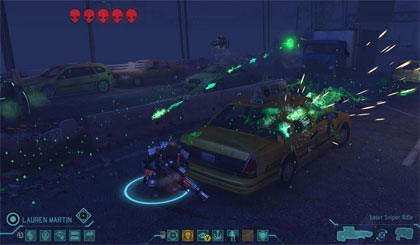
Based on a classic 1995 PC game (which was also ported to the original PlayStation), XCOM: Enemy Unknown is a retelling of sorts. Much like the original, you take control of a command station whose only mission is to rid the planet of an ever-increasing alien attack. You do this by shooting down UFOs, capturing aliens, researching their technologies and selling extra-terrestrial goodies on the grey market. Along the way you'll figure out what they want and how to stop the infestation once and for all.
But let's not get ahead of ourselves. XCOM has several layers and it's important to give each of them proper attention. At its core, this is a turn-based strategy game. It's a bit like Final Fantasy Tactics, only with laser rifles instead of swords. You control a squad of six soldiers as they hunt down aliens through office buildings, forests, underground bunkers, the city streets, farms and all kinds of other scenic locales. Both sides take turns until you've either defeated the alien scum or died trying.
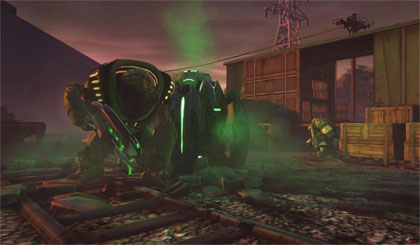
Each soldier gets a total of two moves, which can be used a number of different ways. For example, it might be smart to use one move to locate some sort of cover and then use the other move to target an alien. Player may choose to forgo the action all together and run a great distance across the level. You can also use a move to go into a defensive position, which will force your soldier to shoot at all aliens that run past their line of vision.
The scary part is that you don't know what you're facing when you touch down at a waypoint. The only thing visible is what is directly in front of you, and even that doesn't tell the full story. The levels are large, often with houses and stores the aliens could be hiding in. If you're not careful you'll quickly be swarmed on all sides, and then you'll find most of your team going home in body bags. And like I said, when somebody dies, they stay dead.
You want these soldiers to stay alive as long as possible ... and not just because hiring new recruits is expensive. As your squad kills aliens and survives missions, they'll level up their stats and advance through the ranks. With each promotion they'll be given some sort of perk. For example, the support soldiers will be able to hold three med packs at the same time, while the heavy fire soldiers are now able to fire twice in a single turn. When one of these soldiers dies it leaves a real big hole, one that is not easily replaced. In that sense, XCOM does an excellent job of demonstrating how important experience is on the battlefield.
When you're not battling aliens, you'll be spending all of your time balancing the budget of command central. Now you're in charge of what the scientists research, which parts the engineers make and how well trained the soldiers are. Suddenly you start to see the bigger picture, which involves a league of nations spending money to make sure their borders stay alien-free.
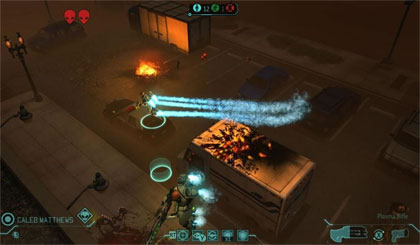
This is where XCOM becomes a juggling act. The idea is to please everybody all of the time. But that's impossible, and eventually you'll find some of the countries begin to peel off. Losing a few countries is no big deal, but don't let that be a habit. If too many counties pull their support, the XCOM project will be shut down and your game will be over.
As you research new technologies, your engineers will be able to build onto the existing base. You'll start with the bare essentials, but before long you'll build a room to house living aliens, a foundry to research weapon upgrades and satellite uplink rooms. The idea is to keep adding satellites to the sky, that way you can monitor alien activities before it's too late. Unfortunately, all of these projects will take time and money.
While you wait for everybody to complete their jobs, you'll take on missions around the world. A lot of your missions will involve you reacting to a call for help, but there are a few variations on this theme. Sometimes you'll need to shoot a UFO out of the sky, resulting in a mission where you're sifting through the wreckage. Other missions will involve civilians to save. Unfortunately, the aliens will kill these innocent people with each turn, so you better hurry. There are also escort missions to contend with, along with a few missions involving defusing bombs. But even with all these distractions, the core fundamentals are almost always the same -- kill all of the aliens.
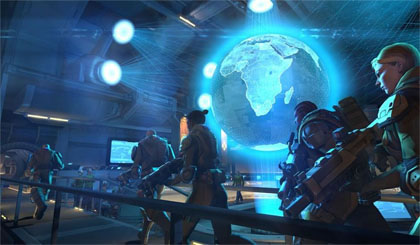
The game comes with more than seventy missions, though they won't always play out the same way. After spending four hours with the game, I decided to take everything I had learned and apply it to a brand new game. I was amazed that none of the missions were repeated; the narrative simply got shoehorned into completely different stages. With so many random variables, it seems perfectly reasonable to play through this game a second time and have an entirely different experience.
Unsurprisingly, XCOM has a nice variety of aliens to fight. You get the little green men we've seen in all those movies, as well as aliens that look like very weird thin men. Another type of alien is a transforming disc. There are heavily armored aliens, flying aliens and an especially illusive alien that disappears. And we haven't even talked about the alien that turns other people into zombies. Just when you think the game is done throwing new enemies your way, an even bigger and scarier one will show up.
With so many different mechanics and systems at work, you might imagine a game full of endless menus and a complicated control set-up. Think again, because Firaxis has managed to create a streamlined experience that is accessible to gamers of all experience levels. The squad tactics aren't so overly complicated that players feel overwhelmed, yet they aren't so simple that it feels dumbed down. All of the needless garbage that dogged this style of game for so long (cluttered menus, manually hitting the end turn button, etc.) has been edited out, replaced with a natural experience that won't scare people off. XCOM has all of the shortcuts and tricks you expect from a modern video game.
Of course, you wouldn't know that just by looking at it. The game is full of so many cinematic flourishes that you may start to think the whole thing is one long cut scene. Even the simple act of shooting at an alien looks like it's straight out of Mass Effect. You'll see your character smash his body up against safety and close-ups of aliens scattering. On the other side of the level is an alien ripping a civilian in two, but don't worry because one of my squad mates dramatically jumps through the window to save the day. It may be a turn-based strategy game, but it's just as exciting as Gears of War.
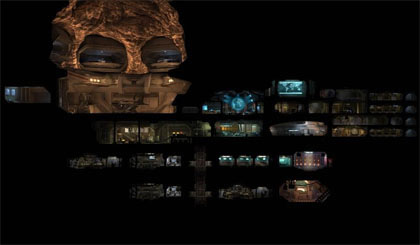
Unfortunately, XCOM does have a few technical problems in its presentation. There are too many scenes to count that involve a frame rate that chugs to a halt, creating some iffy looking cinemas. Other times you get the characters clipping through walls. These problems in most games would be a deal breaker, but they somehow don't negatively impact XCOM. Sure it sometimes looks bad, but the gameplay never suffers. Even with some dropped frames and sluggish animation, the game is a blast to play from beginning to end.
How long it takes you to beat is entirely up to you. If you only focus on the main quest and know what you're doing, you'll be able to power through this in around fifteen hours. Everybody else should expect an adventure of thirty hours or more. The missions themselves can range from less than ten minutes to well over an hour. I had one especially grueling mission take close to two hours to complete. On the other hand, you could totally screw things up and lose control of the planet in just a few hours.
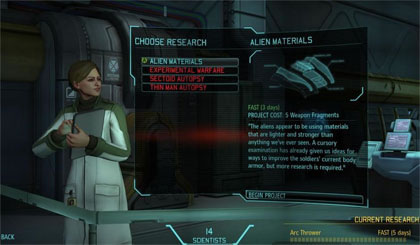
In an interesting move, Firaxis decided to include a one-on-one multiplayer mode. Although bare bones in design, this two-player fight is full of promise. Each player spends points to buy a team which includes both humans and aliens. From there it plays out a lot like a standard XCOM match, with both players taking turns trying to kill each other. The addition of alien characters is a nice change of pace, though there isn't a whole lot to this mode.
XCOM is the classic video game reboot I've been waiting for. As a longtime fan of the series, I'm delighted by the streamlined execution and cinematic flourishes. The fact that your character can die at any moment makes every battle both exhilarating and terrifying. Some of the deaths in this game are the kind of heartbreaking that movies are based on. That kind of emotion is rare in a video game, especially a turn-based strategy game. But that's what makes XCOM one of the best games of the year.
HOME |
CONTACT |
NOW HIRING |
WHAT IS DEFUNCT GAMES? |
NINTENDO SWITCH ONLINE |
RETRO-BIT PUBLISHING
Retro-Bit |
Switch Planet |
The Halcyon Show |
Same Name, Different Game |
Dragnix |
Press the Buttons
Game Zone Online | Hardcore Gamer | The Dreamcast Junkyard | Video Game Blogger
Dr Strife | Games For Lunch | Mondo Cool Cast | Boxed Pixels | Sega CD Universe | Gaming Trend
Game Zone Online | Hardcore Gamer | The Dreamcast Junkyard | Video Game Blogger
Dr Strife | Games For Lunch | Mondo Cool Cast | Boxed Pixels | Sega CD Universe | Gaming Trend
Copyright © 2001-2025 Defunct Games
All rights reserved. All trademarks are properties of their respective owners.
All rights reserved. All trademarks are properties of their respective owners.





























